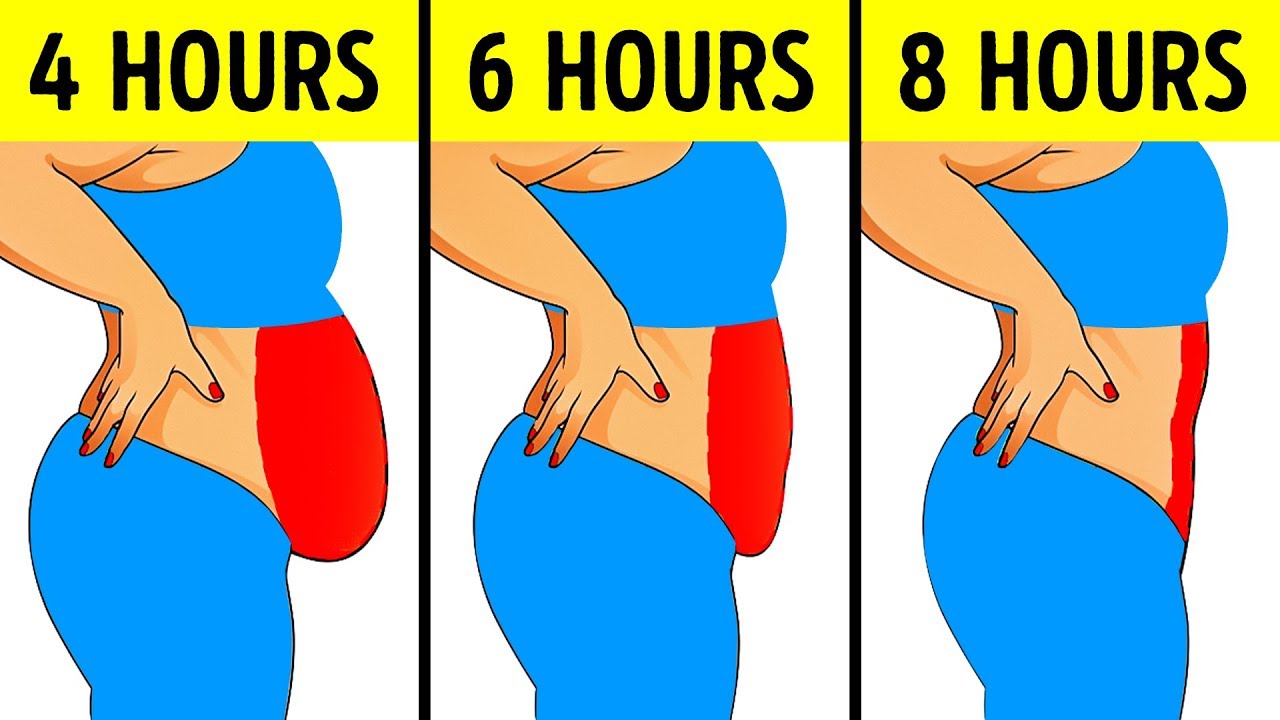
Are you on a quest to shed those extra pounds and wondering about the most effective approach to achieving your weight loss goals? It’s a common question many find themselves asking. When it comes to the best way to lose weight, the key lies in finding a method that works for you and is sustainable in the long run.
Rather than searching for a quick fix or a one-size-fits-all solution, consider making small, yet meaningful, changes to your lifestyle. Incorporating a balanced and nutritious diet, regular physical activity, and maintaining a positive mindset can make a significant difference. Remember, everyone’s journey is unique, so it’s important to figure out what combination of healthy habits suits you best. With patience, determination, and a kind attitude towards yourself, you’ll discover a path towards a healthier weight and a happier you. Keep going, you’ve got this!
Choosing the Right Approach
Understanding Personal Goals
When it comes to weight loss, it’s essential to start by understanding your personal goals. Take some time to reflect on why you want to lose weight and what you hope to achieve. Are you looking to improve your overall health, boost your confidence, or fit into a specific outfit? Understanding your motivations will help you stay committed and focused throughout your weight loss journey.
Consulting a Healthcare Professional
Before embarking on any weight loss program, it’s crucial to consult with a healthcare professional. They can provide valuable guidance tailored to your specific needs and circumstances. A healthcare professional can assess your overall health and help determine the safest and most effective weight loss approach for you. They can also monitor your progress and provide support along the way.
Evaluating Different Weight Loss Methods
There are countless weight loss methods available, but not all of them may be suitable for you. It’s essential to evaluate and consider different approaches to find the one that aligns with your goals, lifestyle, and preferences. Some popular weight loss methods include calorie restriction, low-carb diets, intermittent fasting, and meal replacement programs. Research each method, and consider seeking professional advice to determine which approach may work best for you.
Establishing a Healthy Diet
Emphasizing Nutrient-Rich Foods
One of the most crucial aspects of weight loss is establishing a healthy and balanced diet. Focus on consuming nutrient-rich foods that provide essential vitamins, minerals, and antioxidants. Include plenty of fruits, vegetables, whole grains, lean proteins, and healthy fats in your meals. These foods will provide the necessary nutrients while keeping you fuller for longer, making it easier to manage your calorie intake.
Monitoring Portion Sizes
Regardless of the weight loss method you choose, monitoring your portion sizes is key. It’s easy to overeat, especially when faced with large portions or when dining out. Consider using measuring cups or a food scale to ensure you’re consuming appropriate serving sizes. Portion control is crucial for managing calorie intake and creating a sustainable eating routine.
Incorporating Regular Meals and Snacks
Establishing regular meal and snack times is important for weight loss. Aim to eat three balanced meals and one to two small snacks throughout the day to maintain a steady energy level and prevent excessive hunger. By spacing out your meals and snacks, you can avoid overeating or consuming unhealthy options due to extreme hunger.
Limiting Processed and Sugary Foods
To promote weight loss, it’s crucial to limit your consumption of processed and sugary foods. These foods are often high in calories, unhealthy fats, and added sugars, which can hinder your weight loss progress. Instead, opt for whole, unprocessed foods that are naturally low in added sugars and provide essential nutrients for overall health and well-being.
Staying Hydrated
Often overlooked, hydration plays a vital role in weight loss. Drinking enough water helps to curb cravings, supports metabolism, and aids digestion. Aim to drink at least eight glasses of water per day, or more if you’re physically active or live in a hot climate. Additionally, consider substituting sugary beverages with water, herbal tea, or infused water to reduce unnecessary calorie intake.

This image is property of www.polishedandpink.com.
Engaging in Physical Activity
Finding Enjoyable Exercise
Physical activity is crucial for weight loss and overall health. Find an exercise or physical activity that you genuinely enjoy and look forward to. This will make it easier to stay consistent and motivated. Whether it’s dancing, hiking, swimming, or playing a sport, find an activity that gets you moving and brings you joy.
Creating a Consistent Routine
Consistency is key when it comes to physical activity and weight loss. Aim to exercise for at least 150 minutes per week, or 30 minutes on most days of the week. Establish a routine that works for you, whether it’s exercising in the morning, during lunch breaks, or in the evening. Consistency will help you build strength and endurance over time.
Combining Cardiovascular and Strength Training
For optimal weight loss results and overall fitness, it’s important to incorporate both cardiovascular and strength training exercises into your routine. Cardio exercises, such as running, cycling, or brisk walking, help burn calories and improve heart health. Strength training exercises, such as weightlifting or resistance training, help build lean muscle mass, which increases metabolism and aids in weight loss.
Setting Realistic Fitness Goals
When engaging in physical activity for weight loss, it’s important to set realistic goals. Focus on improving your overall fitness level, rather than solely focusing on the number on the scale. Celebrate small milestones, such as running for an extra minute or lifting heavier weights, and acknowledge the progress you’re making in improving your endurance, strength, and overall well-being.
Incorporating Active Habits in Daily Life
In addition to planned exercise sessions, incorporating active habits into your daily life can contribute to weight loss. Take the stairs instead of the elevator, park further away from your destination, or take short walks during your lunch break. These small changes may seem insignificant, but they add up over time and help increase your overall daily calorie burn.
Ensuring Sufficient Sleep
Understanding the Importance of Sleep
Getting enough quality sleep is often overlooked in weight loss journeys, but it plays a crucial role in your overall well-being. Lack of sleep can disrupt hormones regulating hunger and satiety, leading to increased cravings and overeating. Aim for 7-9 hours of uninterrupted sleep per night to support your weight loss efforts.
Establishing a Sleep Schedule
To ensure sufficient sleep, establish a consistent sleep schedule. Go to bed and wake up at the same time every day, even on weekends. This helps regulate your body’s internal clock, making it easier to fall asleep and wake up feeling refreshed. Avoid electronic devices, caffeine, and stimulating activities close to bedtime to promote better sleep quality.
Creating an Ideal Sleep Environment
Creating a conducive sleep environment can also improve the quality of your sleep. Ensure your bedroom is dark, quiet, and at a comfortable temperature. Invest in a supportive mattress and pillows that cater to your individual preferences. These small adjustments can make a significant difference in your sleep quality and ultimately impact your weight loss journey.
Practicing Relaxation Techniques
If you struggle with falling asleep or find your mind racing at night, practicing relaxation techniques can be beneficial. Engage in activities such as reading a book, taking a warm bath, or practicing deep breathing exercises before bedtime. These calming practices can help relax both your mind and body, making it easier to drift into a restful sleep.
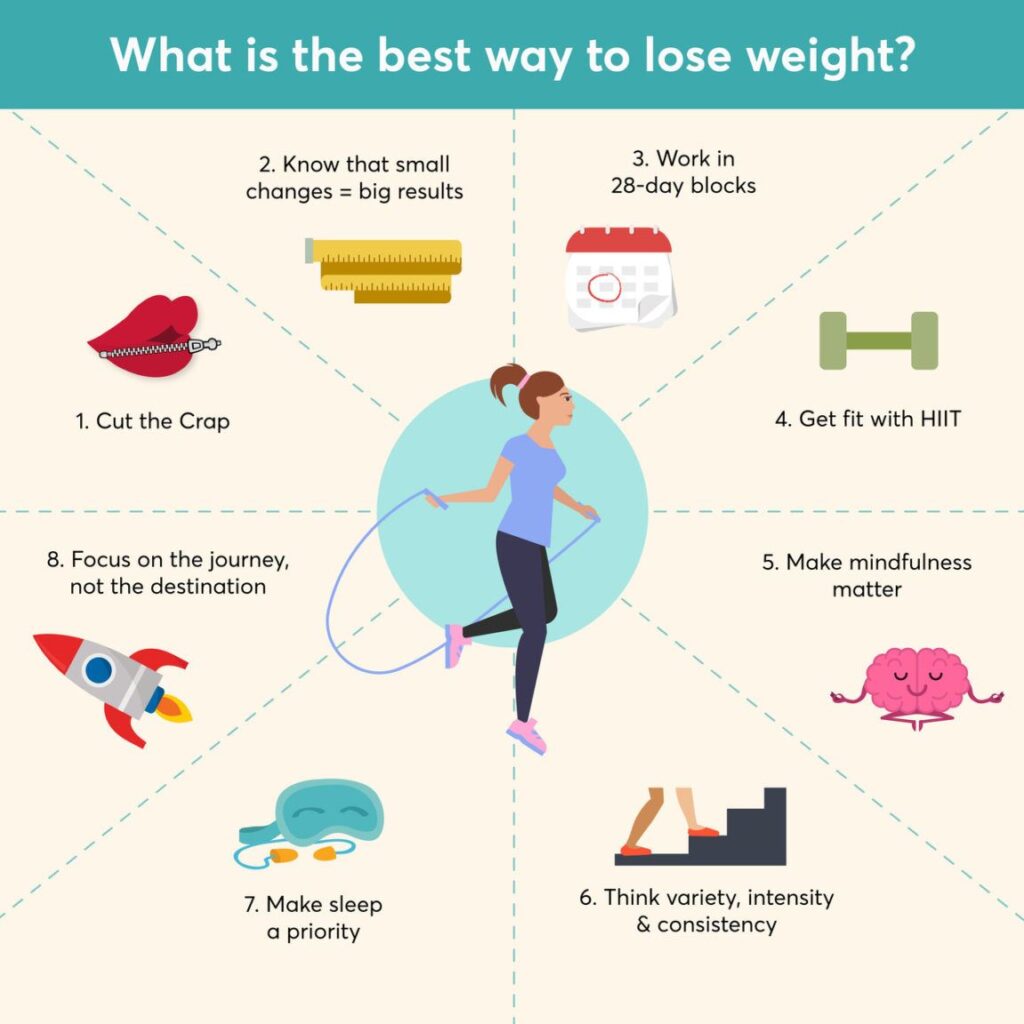
This image is property of eyeofthehurricane.news.
Seeking Social Support
Enlisting the Help of Friends and Family
Having a strong support system can greatly enhance your weight loss journey. Enlist the help of friends and family members who can offer encouragement, accountability, and motivation. Share your goals with them and ask for their support in making healthier choices and staying committed to your weight loss plan. A strong support system can make a significant difference in your overall success.
Joining a Weight Loss Group
Consider joining a weight loss group or program that provides a supportive community of like-minded individuals. These groups often offer guidance, resources, and a safe space to share experiences and challenges. Being surrounded by individuals who are on a similar journey can boost your motivation, provide valuable insights, and help you stay on track towards your weight loss goals.
Utilizing Online Support Communities
In addition to in-person support groups, online support communities can also be a great resource for connecting with individuals who share similar weight loss goals. There are several online forums, social media groups, and mobile applications dedicated to weight loss and healthy living. Engaging in these communities can provide inspiration, advice, and the opportunity to share experiences with others facing similar challenges.
Managing Stress Levels
Identifying Sources of Stress
Stress can have a significant impact on weight loss efforts. Take some time to identify the sources of stress in your life and brainstorm ways to minimize or cope with them. Whether it’s work-related stress, relationship issues, or financial pressures, finding healthy ways to manage stress is essential in maintaining a balanced and sustainable weight loss journey.
Practicing Stress Management Techniques
Incorporate stress management techniques into your daily routine to reduce stress levels. These techniques may include deep breathing exercises, mindfulness meditation, journaling, or engaging in hobbies or activities that bring you joy and relaxation. Experiment with different techniques to find what works best for you and make them a regular part of your routine.
Engaging in Relaxing Activities
Make time for activities that promote relaxation and self-care. This could include taking a long bath, going for a nature walk, practicing yoga or tai chi, listening to calming music, or engaging in creative endeavors. By prioritizing relaxation and self-care, you can reduce stress and create a positive mindset, making it easier to stay focused on your weight loss goals.
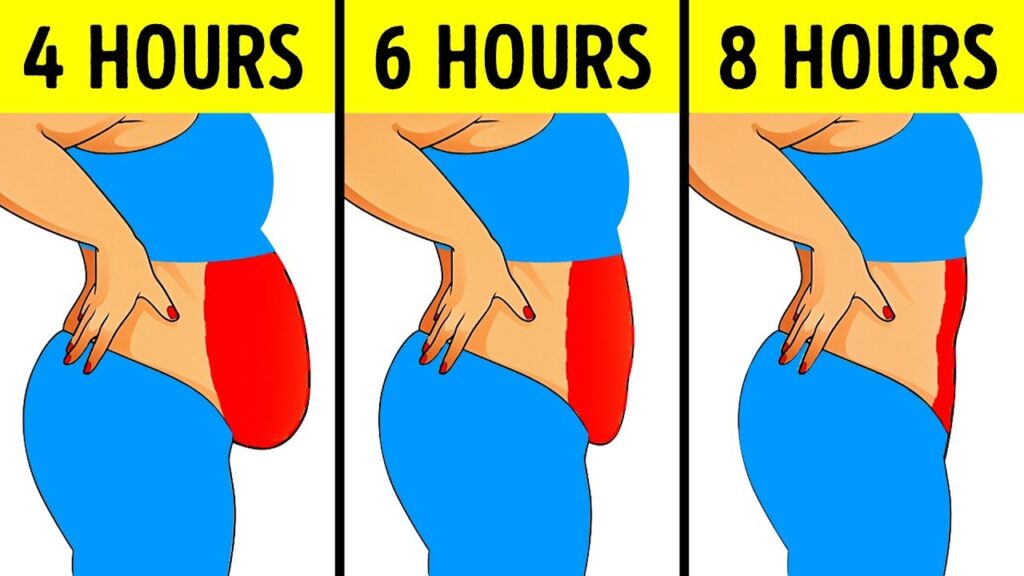
This image is property of i.ytimg.com.
Tracking Progress and Adjusting Goals
Setting Measurable Objectives
To stay motivated and measure your progress, it’s essential to set specific and measurable objectives. Rather than simply aiming to “lose weight,” set goals such as losing a certain number of pounds per month or fitting into a specific clothing size. Track your progress regularly and celebrate achievements along the way, no matter how small.
Recording Weight, Measurements, and Food Intake
Keep a record of your weight, measurements, and food intake to monitor your progress and identify any areas where adjustments might be necessary. Use a journal, an app, or a spreadsheet to document your daily activities and be honest with yourself. This record can help you identify patterns, track your calorie intake, and make informed decisions about your nutrition and exercise routine.
Celebrating Milestones
To stay motivated and maintain momentum, it’s crucial to celebrate milestones along your weight loss journey. Each achievement, whether it’s reaching a certain weight or successfully completing a fitness challenge, deserves recognition. Reward yourself with non-food treats, such as a new workout outfit or a spa day, to reinforce your progress and keep yourself motivated.
Reassessing and Modifying Strategies
Weight loss is not a linear process, and it’s important to regularly reassess and modify your strategies. If you find that certain approaches are not yielding the desired results, don’t be afraid to make adjustments. Consult with a healthcare professional or a registered dietitian to evaluate your progress and explore alternative methods or approaches that may be better suited to your individual needs.
Staying Motivated and Focused
Setting Realistic Expectations
Maintaining realistic expectations is crucial for staying motivated and focused on your weight loss journey. Remember that weight loss is a gradual process, and it’s normal to experience fluctuations and plateaus along the way. Focus on the overall progress you’re making, both physically and mentally, rather than solely fixating on the number on the scale.
Focusing on Non-Scale Victories
Weight loss is not solely determined by the number on the scale. Celebrate the non-scale victories that come with a healthier lifestyle, such as increased energy, improved mood, better sleep quality, or fitting into clothes more comfortably. By shifting your focus to these positive changes, you’ll stay motivated even during periods when the scale may not move as quickly as you’d like.
Rewarding and Treating Yourself
Rewarding yourself along the way is an important aspect of staying motivated. However, instead of using food as a reward, find alternatives that support your weight loss goals. Treat yourself to a massage, buy a new book, or plan a day trip to celebrate your achievements. These rewards will reinforce your progress and serve as a reminder of how far you’ve come.
Incorporating Mindfulness Techniques
Practicing mindfulness can help you stay focused and make conscious choices throughout your weight loss journey. Pay attention to your hunger and fullness cues, savor each bite of food, and eat without distractions. Engage in activities such as yoga or meditation to cultivate a greater sense of mindfulness and self-awareness. By being present in the moment, you can make more mindful decisions that support your weight loss goals.
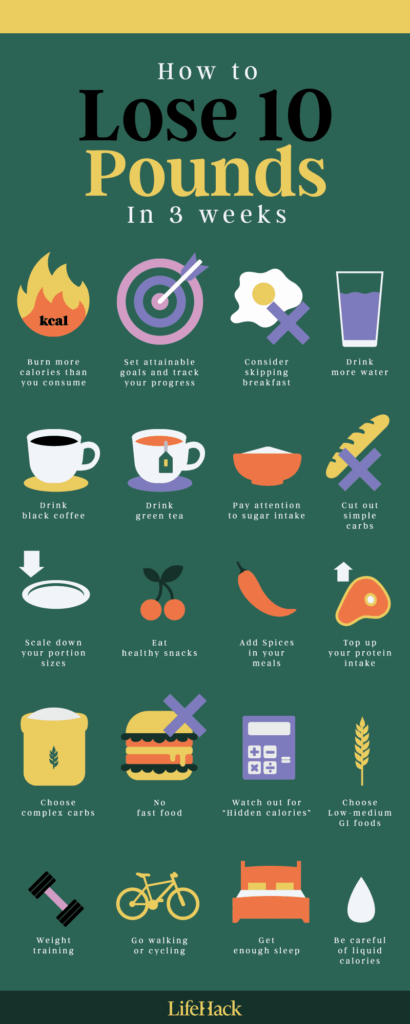
This image is property of cdn.lifehack.org.
Understanding Common Challenges
Overcoming Plateaus
It’s common to experience weight loss plateaus, where your progress slows down or temporarily halts. Plateaus can be frustrating, but it’s important to remember that they are a normal part of the weight loss process. To overcome plateaus, consider adjusting your exercise routine, reassessing your calorie intake, or introducing new types of physical activity. Stay patient and consistent, and trust that progress will resume.
Dealing with Emotional Eating
Emotional eating is a common challenge many people face during their weight loss journey. Stress, boredom, sadness, or even happiness can trigger emotional eating. To combat emotional eating, practice identifying your emotions and finding alternative coping mechanisms that don’t involve food. Engage in activities that bring you joy, seek support from loved ones, or consider consulting with a therapist if emotional eating becomes a recurring issue.
Combating Food Cravings
Food cravings can be a significant obstacle in weight loss efforts. When faced with cravings, try to identify the underlying cause. Are you truly hungry, or is it an emotional or habitual craving? Distract yourself with a non-food activity, drink a glass of water, or opt for a healthier alternative to satisfy your cravings. If you find that certain foods consistently trigger cravings, it may be helpful to limit your exposure to those foods.
Avoiding Fad Diets and Quick Fixes
In your quest for weight loss, it’s essential to avoid falling into the trap of fad diets or quick fixes. These approaches often promise dramatic results but can be unsustainable or unhealthy in the long run. Instead, focus on adopting a balanced and varied diet, engaging in regular physical activity, and implementing sustainable lifestyle changes. Slow and steady progress results in lasting and healthy weight loss.
Celebrating a Sustainable Lifestyle
Embracing a Long-Term Approach
Weight loss should not be viewed as a temporary fix but as a long-term lifestyle change. Embrace the mindset that you’re adopting healthy habits for life, rather than seeking quick solutions. This long-term approach ensures that you not only lose weight but also maintain it in a sustainable manner, supporting your overall health and well-being.
Maintaining a Balanced and Varied Diet
After achieving your weight loss goals, it’s crucial to maintain a balanced and varied diet to prevent weight regain. Continue prioritizing nutrient-rich foods and portion control. Allow yourself occasional indulgences in moderation to cultivate a healthy relationship with food. Practicing flexibility and balance in your diet will help ensure long-term success.
Prioritizing Self-Care
Self-care plays a vital role in maintaining a healthy lifestyle. Prioritize self-care activities such as getting enough sleep, managing stress, engaging in hobbies, and taking time for yourself. Taking care of your physical and mental well-being will support your weight loss efforts and help you sustain a healthy lifestyle in the long run.
Building a Supportive Environment
Surround yourself with a supportive environment that promotes your well-being and encourages healthy choices. Share your goals with loved ones and ask for their support in creating an environment conducive to your weight loss journey. Consider engaging in activities together, such as cooking healthy meals or exercising as a group. A supportive environment can make a significant difference in maintaining your weight loss and leading a healthy lifestyle.
In conclusion, choosing the right approach to weight loss starts with understanding your personal goals, consulting a healthcare professional, and evaluating different weight loss methods. Establishing a healthy diet, engaging in physical activity, ensuring sufficient sleep, seeking social support, managing stress levels, and tracking progress are all essential components of a comprehensive weight loss plan. By staying motivated, focused, and celebrating non-scale victories, you can overcome common challenges and embrace a sustainable and healthy lifestyle. Remember, weight loss is a journey, not a destination. Enjoy the process and celebrate every step towards a healthier, happier you.
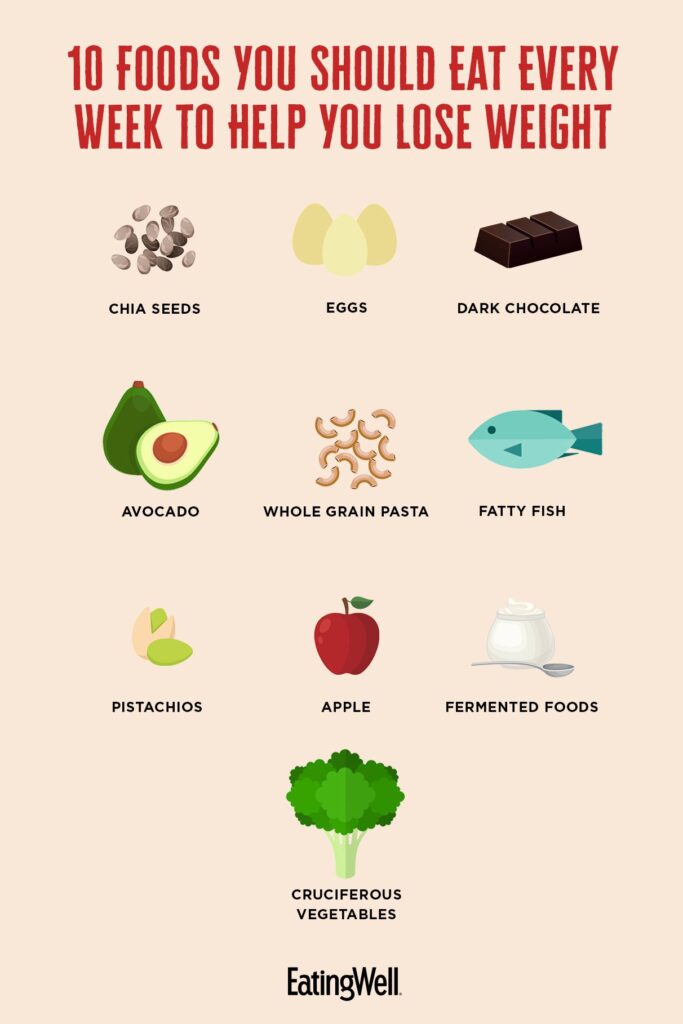
This image is property of www.eatingwell.com.